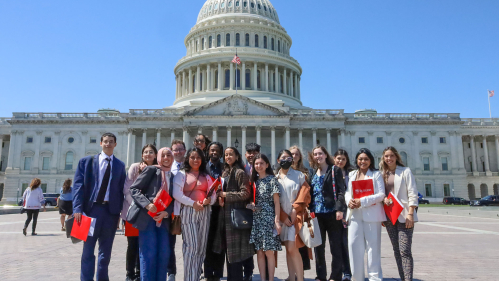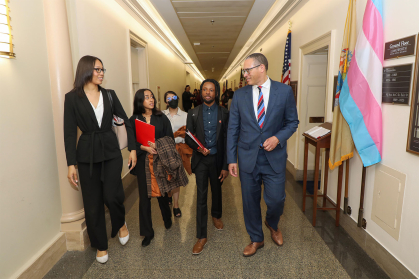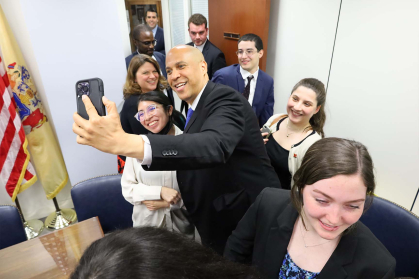Rutgers Students Advocate for Financial Aid on Capitol Hill

A group of 16 undergraduates met with members of the New Jersey congressional delegation
Valerie Valle graduated at the top of her class from Arts High School in Newark and wanted to become an immigration attorney. But despite her academic achievement and drive, the 21-year-old Rutgers University-Newark student would not have been able to afford to go to a four-year college if she had not received federal education grants to help her pay the bill.
“I always knew I wanted to go to college but always worried about how we could afford it and where the money would come from,” said Valle, a junior who is part of the Honors Living-Learning Community. “My mom always told me, ‘don’t worry, just do good in school and we will figure it out.'"
Valle, a junior public administration major and political science minor who says she would like to sit on the Newark City Council one day, was among a contingent of 16 Rutgers students who traveled to Washington, D.C., on Tuesday to advocate for federal student aid funding.
For the past two decades, Rutgers students have traveled to Capitol Hill to put a human face on the need for continued funding and to thank legislators for their support.
“It is deeply gratifying to witness some of our most civically engaged students confidently and passionately advocate for their peers with our nation’s lawmakers,” said Rutgers President Jonathan Holloway, who joined the students in several of their meetings with legislators.

This week’s trip was the first time since the COVID-19 pandemic that the group was able to travel to the Capitol to advocate in person.
“This was my first time in D.C. and I had a blast,” said Tasawn Roberts, a junior at Rutgers-New Brunswick majoring in political science and government in the School of Arts and Sciences. “I was able to sit down and discuss federal student aid with our amazing representatives like Representatives Donald Payne and Rob Menendez and Senator Cory Booker and the health policy adviser for Rep. Bill Pascrell. The trip exceeded my expectations.”
More than 17,000 Rutgers students and over 6 million college students nationwide receive Pell Grants, according to the U.S. Department of Education. This year, low-income college students will get an extra $500 to help them pay for their education. President Joe Biden signed a federal spending plan in January that raised the maximum amount to almost $7,400 from $6,895. Students urged Congress to support the president’s proposed increase to Pell Grants, which would increase the maximum award to $8,215 in 2024. Biden would like to see the grants increase to $13,000 annually by 2029.
“While spending the day on Capitol Hill and walking the halls of Congress is exciting and inspiring, it also provides our students practical advocacy skills that they can use throughout their lives to engage on issues they are passionate about,” said Francine Newsome Pfeiffer, vice president for federal relations at Rutgers.
Esmeralda Diaz-Calderon, a senior at Rutgers-University Camden who grew up economically disadvantaged, said federal investments in student aid and her involvement as a Rutgers Future Scholar since 7th grade, a program that provides full tuition through scholarships and federal grants, are the only reasons she was able to go to college. The 22-year-old, who will start law school in September at Drexel University Law School in Philadelphia, said her kindergarten teacher told her she should be a lawyer after she argued with her one day. “My ultimate goal is to work for the Innocence Project, helping exonerate people wrongly convicted.”
Kiran Sheth, who will graduate in May from Rutgers-New Brunswick with a degree in digital communications and political science, is an out-of-state student from Boston. Although she is not a recipient of a Pell Grant or any other federal aid, she has friends who are and has always been involved in advocacy work.
“I think it is really important for the people in government to hear from all of us,” said Sheth, who works as a communications intern in the office of Gov. Phil Murphy. “We are here to encourage members of Congress to continue to pass federal budgets that increase funding for higher education.”

The New Jersey legislators or their staff members who met with students included: Sen. Cory Booker and Sen. Bob Menendez, Rep. Rob Menendez (D-8th), Rep. Donald Payne (D-10th), Rep. Josh Gottheimer (D-5th), Rep. Jeff Van Drew (R-2nd), Rep. Frank Pallone (D-6th), Rep. Donald Payne, Jr. (D-10th), Rep. Chris Smith (R-4th), Rep. Donald Norcross (D-1st), Rep. Tom Kean (R-7th), Rep. Bill Pascrell (D-9th) and Rep. Andy Kim (D-3rd).
Students urged Congress to reinstate and make permanent the mandatory inflation adjustment for Pell Grants, which expired at the end of 2017. They also asked them to reintroduce the Pell Grant Preservation and Expansion Act, which would expand Pell eligibility to Dreamers and expand student lifetime eligibility.
Diaz-Calderon said she met with representatives from the legislative offices of Norcross, Kean and Van Drew and joined the entire group again to meet with Sen. Booker. Her message, she said, was the importance of raising federal funding not only for Pell Grants but also for federal TRIO and Work-Study programs designed to help students from disadvantaged backgrounds.
“Overall, it was such an irreplaceable experience,” she said. “I’m so glad the university gave us the opportunity to go advocate for ourselves and our peers.”


